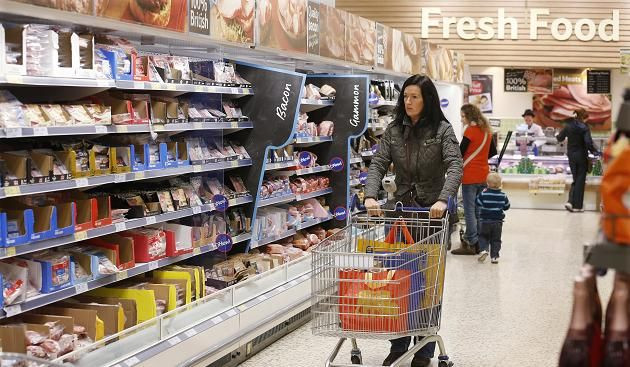Tesco’s (TSCO) Struggles In The U.S., China And Europe

U.K. supermarket giant Tesco PLC (LON:TSCO), the world’s third-largest food retailer with global sales of 35.5 billion pounds ($57.5 billion), has struggled hard to compete outside its domestic market, as its earnings on Wednesday morning indicated.
Here’s a look at Tesco’s struggles in major markets in the United States, China and Europe. More broadly, sales declined in all nine of its international markets, according to company statements on Wednesday.
The firm’s overall profits fell 23.5 percent, it said in its earnings. Company shares fell as much as 4.7 percent during trading on Wednesday, after earnings came out.
Europe
Tesco reported a sales decline of 5.5 percent for its first half in its three key European markets of Ireland, Central Europe and Turkey on Wednesday, marking the newest geographic frontier of its troubles.
Trading profits for the firm’s European unit also fell a whopping 70 percent, to 55 million pounds, from 171 million pounds the year before. Cutbacks on capital spending in Europe of 51 percent were announced, leaving new investment there at a slim 100 million pounds.
The company blamed a tough European economic climate, referring mostly to “external” trends restraining consumer spending. But Tesco also noted “strong competition” and a growing fondness among European shoppers for smaller grocery stores, which bodes badly for Tesco’s massive hyper-mart format.
New stores will be slow to grow in Europe, too, as the company seems wary of expansion for the near future. Tesco opened 75 percent less square feet of new stores space in its first fiscal half, compared to last year.
Business in some European markets was summed up as “pretty atrocious”, Shore Capital analyst Darren Shirley told Bloomberg. “Europe most certainly needs attention from Tesco’s management,” he said.
United States
Tesco formally decided to quit the U.S. in April 2013, taking a global write down then of $3.5 billion amid its first losses in decades, according to Reuters.
But their U.S. entrance in 2007, via the Fresh & Easy grocery chain, took a twist earlier this week as Fresh & Easy filed for bankruptcy on Monday, even though they’d already sold themselves substantially to the Yucaipa Companies LLC.
The exit will cost Tesco about 150 million pounds.
Food retail analyst Burt Flickinger, with the Strategic Resource Group, told International Business Times that the bankruptcy made the best of a bad situation, however.
“Tesco had studied the U.S. market for not too long,” when they first began, Flickinger said. Input primarily from U.K. advisers, and little expertise from U.S. strategists, contributed to the problem, he said.
“Whether it was Arizona, or California, they paid at the top of the [real estate] market, so the properties could never be productive or profitable,” Flickinger said of many of Tesco’s Fresh & Easy stores, concentrated mostly on the West Coast.
Supermarket News reported earlier this week that landlords are likely to be upset, as bankruptcy lets Fresh & Easy avoid rent payments on already established long-term leases.
“It’s tough on Tesco, and tough on the secured and unsecured creditors, with the landlords being some of the unsecured creditors,” Flickinger said of Tesco’s messy U.S. situation.
China
Tesco also revealed further details of its planned partnership with massive China retailer China Resources Enterprise, Limited (CRE) (HKG:0291), on Wednesday.
But the takeaway seems to be that Tesco’s joint venture, unveiled in August, effectively signals the company’s exit, or at least a serious departure, from the world’s second-largest economy.
Tesco said it’d pay 4.3 billion Hong Kong dollars ($544 million) to help set up the venture. But the company’s 20 percent stake and contribution of 134 Chinese stores are dwarfed by CRE’s nearly 3,000 stores.
Tesco will also only appoint two board members from 10 total.
For the past two fiscal years, ending February 2012 and 2013, Tesco lost 77 million pounds and 72 million pounds respectively in China.
Anson Chan, an analyst at the K.G.I. brokerage in Hong Kong, told the New York Times that Tesco’s China losses, at least according to their new business partner CRE, may be due to its inability to scale, which caused the U.K. company to underuse its global supply chain.
The rise of online shopping for household goods has also hurt profits for big Chinese retailers, industry experts told the Times.
“This may look win-win, but in reality, Tesco is saying, ‘I can’t figure out China’,” said one Hong Kong mergers and acquisitions banker, to Reuters, back when the joint venture was first announced.
Listen to company executives and analysts dissect Wednesday’s earnings here.
© Copyright IBTimes 2024. All rights reserved.





















